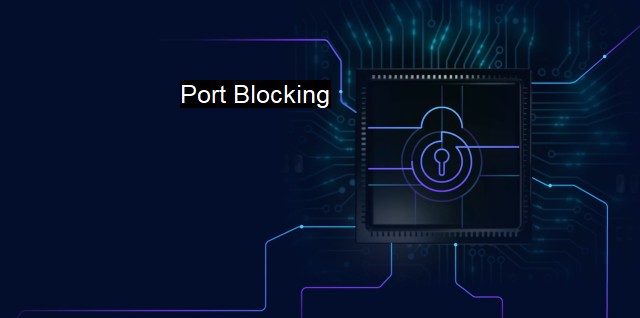What is Port Blocking?
Secure Networking: Understanding Port Blocking and Its Role in Cybersecurity
Port blocking, with is a crucial technique employed to prevent unauthorized access or malicious attacks on a computer network, system, or an individual device. This process typically involves censoring or blocking a certain internet port or a range of ports that might be susceptible to any unwanted traffic that endangers the utilities of the original system.Specifically, ports can be considered digital doors through which data moves into and out of devices to communicate over the internet. They comprise a part of the addressing information in the header of a network packet. When software applications (e.g., web servers, email servers, or data transfer apps) want to receive information from external devices, they open specific, pre-defined port numbers to let the information in. When a port is open, it becomes a potential gateway for cyberattackers; thus, invested parties often use port blocking to close these gateways or restrict unauthorized access sharp.
In opposing ways, port blocking can either allow data requests through specific ports while blocking access to the others, or it can disallow any data from passing through all ports, opening way for unitarily approved ports only. This selective approach provides a key balance in network-fluidity and a fortified amount of security control for different network settings like data communication, protocols, IT assets, etc.
From a cybersecurity perspective, port blocking functions as a substantial part of a Firewall defense. Firewalls exercise rigorous control and guide how data transmit over a network, and hence you can consider them as the first line of defense in cybersecurity infrastructure. By enabling port blocking, firewalls amplify their capabilities to tinker the inbound and outbound traffic-transmission between the web and the network and prevent unwanted access, potential threats, or security breaches from infiltrating their systems.
Most antivirus software integrates port blocking in their regimen to compensate for the element of proactive security. This mitigates the potential vulnerabilities that hackers and malware might exploit. Some antivirus software even allows the user to manually block certain ports that they don’t use or suspect as malignant.
Despite its immense role port blocking is not an all-in-one solution. Given that some ports must remain open for necessary internet functions, it leaves networks prone to risks that cybercriminals might exploit. Therefore, it should not replace other security measures like antivirus software, secure network connections, periodic firmware updates, software penalties, etc.
In a larger view, port blocking becomes a preventive policing tool that Internet Service Providers (ISPs) use for a vaster cause. ISPs resort to port blocking to prevent their customers from participating in actions that might infringe on copyright laws, promote SPAM, or enable unsolicited network activities. This strategy includes the throttling of certain traffic, promotion of network hygiene, enforcing regulations and policies.
Understanding the dynamic nature of web, safe internet practices stress on constant vigilance, leveraging technological helpers like firewalls and antivirus software. The advancements in these lend a more comprehensive security suite that ensures a secure and seamless user experience. Amongst these, port blocking establishes itself as an ageless strategy.
To sum it up, port blocking inherently remains inseparable from the saga of cybersecurity and antivirus systems. With hackers using more sophisticated techniques as days pass by, port blocking becomes an enduring strategy for network security, enhancing the splendor of the carefully crafted hull of cybersecurity, from personal devices to enterprise networks. Its part in augmenting firewall competencies, facilitating ISP regulations, or fortifying antivirus responses step-ups its stand as a crucial brick in the palace of secured internet sequencing. it's essential to reminisce that it serves as just one layer of the many faceted approaches toward network security.

Port Blocking FAQs
What is port blocking in the context of cybersecurity?
Port blocking refers to the technique of restricting access to a specific network or internet port on a device or network. It is commonly used by security-conscious organizations to prevent unauthorized access to their systems through a specific communication channel.Why do antivirus programs use port blocking?
Antivirus programs use port blocking to protect the device or network from potential cyber attacks. By blocking specific ports, antivirus software can prevent malicious software from communicating with remote servers, thus reducing the risk of infection.Can port blocking affect my internet speed?
Yes, port blocking can affect your internet speed. If a port that is necessary for a specific application or service is blocked, it can slow down the performance of that application. It's important to ensure that necessary ports are open in order to maximize internet speed and performance.How can I check if a port is blocked on my device or network?
There are various tools and methods to check if a port is blocked on your device or network. One common method is to use a port scanner tool that tests different ports to determine if they are open or closed. Another option is to consult with your IT department or network administrator to verify if any specific ports are blocked as part of your organization's security policies.| | A | | | B | | | C | | | D | | | E | | | F | | | G | | | H | | | I | | | J | | | K | | | L | | | M | |
| | N | | | O | | | P | | | Q | | | R | | | S | | | T | | | U | | | V | | | W | | | X | | | Y | | | Z | |
| | 1 | | | 2 | | | 3 | | | 4 | | | 7 | | | 8 | | |||||||